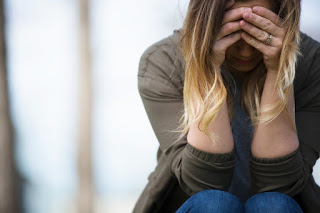As a writer and public speaker who aims to bring hope to those with PTSD by sharing my story of how I developed the disorder after witnessing a tree fall on my father during a fast moving storm, people often share with me stories about their traumas and how it affected them. The sentence structure is typically the same; “This bad thing happened to me and then later on something related to that bad thing happened and it made me think about the first bad thing so now I have PTSD.”
I follow up this statement with this, “That’s awful. Were you diagnosed by a mental health professional?”
“No,” is what typically follows.
Usually I suggest people do that, especially early on so that they can learn tools for coping with PTSD, something I wish I had done twenty years ago when my PTSD developed. I’m often met by resistance with this suggestion, which makes me wonder if perhaps they feel they don’t need help from a professional or what they’re experiencing is not that serious.
I think these kinds of conversations have arisen thanks to PTSD becoming familiar. Twenty years ago when my journey first started, PTSD existed, but it wasn’t talked about like it is today. Thanks in part to veterans needing assistance after returning from the recent wars, plus the numerous natural and man made disasters that have occurred, our society has been forced to learn more about PTSD. In that need to know, information gets misunderstood and PTSD becomes as common as a buzzword.
I remember people posting on social media that they were experiencing PTSD after the 2016 presidential election. Then months later during the Super Bowl when the Patriots came from behind in a stunning turn of events, friends of mine posted how this was reminding them of the 2016 presidential election and they were experiencing PTSD from that night. Then an article with “PTSD” in the titled popped up on LinkedIn, though not a single sentence in her article substantiated anything related to experiencing PTSD. I’ve seen social media posts about being startled by something like a fire alarm and feeling PTSD as a result, and when I suggest to the person posting that they take care of themselves, often the reply I see is “well, I don’t really have PTSD….I suppose I shouldn’t have said that.”
News flash….none of these examples actually relate to PTSD.
As my contribution to helping stop the misuse of PTSD, let me explain the difference between a flashback and a bad memory, which seems to be the basic misunderstanding of what PTSD is really all about. A flashback feels like you’re actually re-experiencing a traumatic event, whereas a bad memory is merely a reminder. Flashbacks are a symptom of PTSD. Bad memories are not.
I’ll give you an example of a bad memory that may appear like a flashback that I recently experienced. I was cleaning my windows at my house, and as I sprayed the cleaning solution on the window, I got a whiff of it’s odor. Immediately, I remembered washing outhouses at Girl Scout camp. I hadn’t thought about Girl Scout camp in decades. I loved Girl Scout camp, but one component of camp was a chore had to be done every day, including cleaning the outhouse. Outhouse cleaning involved washing the toilet seat, restocking the toilet paper, filling the water jugs and replacing the hand soap. Because camp was during the summer, the smell was awful. As I sprayed my windows, it reminded me of the smell of the cleaning solution that we used to scrub the toilets and memories of cleaning these outhouses came to mind. However, I still felt the same as I continued cleaning the windows.
Now allow me to explain a flashback. My worst one occurred during an unusual October snowstorm in New Jersey in 2011, fourteen years after my initial traumatic experience. My husband and I were sitting in our living room. I was reading a magazine. After about ten inches of thick, heavy snow fell around our house, I heard that sound that immediately took me back to my traumatic experience. It was the sound of a tree ripping apart. As a large tree that borders our property with our neighbor’s fell, I felt like I was back on the porch of my childhood home watching the tree fall on my father during the storm. I was re-experiencing my traumatic event. I went into panic mode. My heart rate increased, my hands started to sweat and I barked at my husband. I also shook and for a week afterwards anxiety was a constant undertone of my day. Thankfully after seeing a therapis, that’s been the last flashback I’ve experienced.
That’s the difference.


